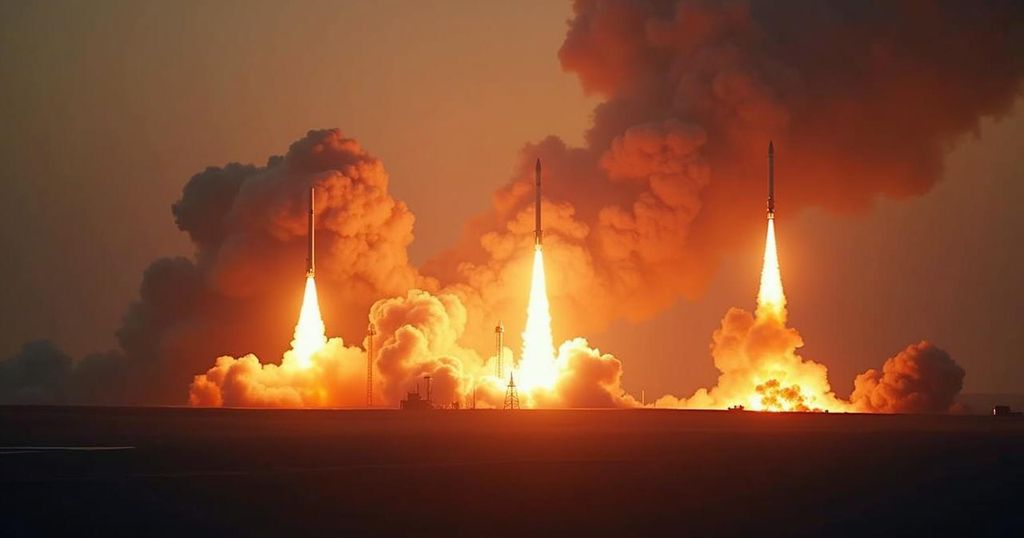Iran has launched ballistic missiles toward Israel amidst escalating tensions, while Turkey pledges support for Lebanon. Major airlines have suspended flights to Israel due to safety concerns, and Israel continues military operations against Hezbollah. Amnesty International calls for intervention regarding a cargo vessel suspected of carrying explosives for Israel, while China condemns Israeli military actions against Lebanon.
In a significant escalation of hostilities, Iran’s Islamic Revolutionary Guard Corps has reportedly launched numerous ballistic missiles toward Israel. In a related development, Turkish President Recep Tayyip Erdogan reaffirmed Turkey’s unwavering support for Lebanon amid Israel’s military actions, promising comprehensive assistance to Lebanon during these challenging times. Additionally, major airlines including KLM have extended their suspension of flights to Israel through the end of the year due to the worsening security situation in the region. KLM spokesperson Elvira van der Vis stated, “Given the situation in the region we’ve decided to extend a suspension of flights to Tel Aviv until the end of the year.” Other airlines, such as Air France and Emirates, have also temporarily halted operations to the area. Reports have emerged indicating that airstrikes have targeted the southern suburbs of Beirut, further complicating the regional dynamics. Insights from the Israeli military indicate an ongoing operation in southern Lebanon, where special forces have conducted targeted raids against Hezbollah’s Radwan unit. Spokesperson Daniel Hagari disclosed that these operations aim to dismantle Hezbollah’s military capabilities, particularly its weapons stockpiles and tunneling infrastructure. Despite the progress, Hagari noted that more efforts are needed, leading to the anticipation of a prolonged operation. Israeli columnist Gideon Levy remarked on the possible complications of Israel’s land offensive, suggesting that Israel’s approach in Lebanon may lead it into a predicament similar to its current situation in Gaza. In a significant military response, Israel has also engaged Syrian military targets, reportedly striking several radar stations in southern Syria. In another critical development, Amnesty International urged Montenegro and Slovenia to prevent a shipment suspected of carrying explosives meant for Israel from docking at their ports. This cargo is believed to facilitate further conflict in the region. China has condemned Israel’s military actions, calling them infringements on Lebanon’s sovereignty. The Chinese Foreign Ministry expressed its opposition to any escalatory actions in the region. Israeli authorities, meanwhile, continue to assert that their military operations are aimed at securing their borders against potential threats from Hezbollah, as they prepare for possible extended military actions.
The article addresses the escalating tensions between Iran, Israel, and Hezbollah, framed within the broader context of ongoing military operations and international responses. The Islamic Revolutionary Guard Corps of Iran has launched ballistic missiles targeting Israel, signifying a sharp increase in regional hostilities. Turkey is politically aligned with Lebanon, offering support amid Israeli strikes as civil aviation in the region suffers disruptions due to safety concerns. The Israeli military’s targeted operations against Hezbollah in southern Lebanon are part of a longer strategy to counter perceived threats. The situation has drawn attention from various global actors, highlighting international interests and regional sovereignty issues.
In conclusion, the ongoing military actions and political maneuvers surrounding Israel, Lebanon, and Iran signify a rising tide of conflict in the region. With multiple nations and organizations weighing in on the situation, the potential for further escalations remains high. The international community is closely monitoring developments, as both military and diplomatic strategies continue to evolve amid heightened tensions.
Original Source: www.aljazeera.com







